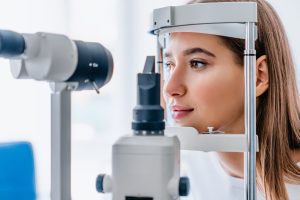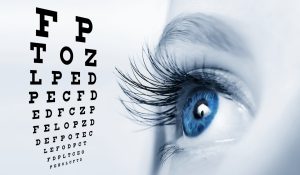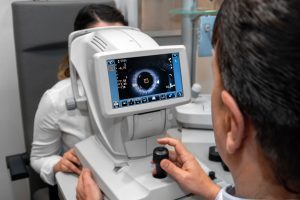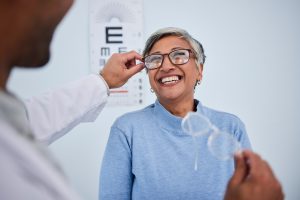Adults Eye Exams
HOW OFTEN SHOULD YOU HAVE AN EYE EXAM?
At Louie Eyecare Centre, we recommend a comprehensive eye exam every two years if you are between the ages of 20 and 64 or any time you are experiencing new vision changes. If there is a new health concern like redness, pain, vision loss, new floaters, or injury, a health assessment is covered by Alberta Health Care for all residents. If you have a chronic health condition or are taking medication related to the vascular system (diabetes, high blood pressure, blood thinners, cholesterol, or inflammation) a yearly exam is recommended. Sometimes health exams for these conditions are covered by Alberta Health Care, but this does not include a prescription for glasses.
If you are experiencing any vision changes or have any questions, please call us, and we will be happy to discuss whether you should be seen urgently and what is covered.
WHY? PREVENT, DIAGNOSE AND TREAT OCULAR DISEASES IN THE EARLY STAGES TO PREVENT IRREVERSIBLE VISION LOSS!
Annual visits to your optometrists are essential to maintaining your vision and diagnosing serious eye issues such as complications from vascular diseases like diabetes and hypertension, development of glaucoma, macular degeneration, and cataracts. Although many of the ocular diseases that cause vision loss and blindness develop slowly, they often do not have any initial symptoms. Early detection, proper diagnosis and care, and treatment can greatly reduce future risk of severe vision loss and complications.
In first world countries, 80% of blindness in those aged 20-74 is preventable and treatable. Many are related to undiagnosed diseases such as glaucoma and macular degeneration which have no symptoms at all until there is irreversible damage and vision loss. A professional comprehensive eye exam includes:
- Evaluation for acuity and refractive issues like myopia (nearsighted), hyperopia (farsighted), and presbyopia (inability to change focus distance to near).
- Evaluation of the fundus (back of the eye) for retinal diseases such as complications from diabetes, hypertension, and cholesterol.
- Testing for ocular disease such as glaucoma, macular degeneration, and peripheral retinal holes, tears, or breaks.
- Biomicroscopy evaluation for cataracts.
- And much more…
At Louie Eyecare Centre, Dr. Louie and Dr. Larson with their years of expertise, advanced diagnostic skills, and above the standard of care equipment, can provide in-depth comprehensive eye exams for adults and seniors, emergency ocular health evaluations, contact lens evaluations, and abnormal ocular health detection, diagnosis, and treatment.
They also strive to provide education and compassionate care while explaining what may be happening to your vision and ocular health.
There are a few things that you can do to prepare for an eye exam. Come with a list of all the medications you are currently taking and any information about your prescription for your current glasses or contact lenses.
Age: 19 - 64
- Optomap 3D Retinal Photograph: This type of retinal imaging technology is non-invasive and painless. It provides a wide-field, high-resolution view of the back of the eye, including the retina and optic nerve. This technology captures a digital retina image, allowing us to examine and analyze the eye’s health in greater detail.
- Visual acuity test: This test measures your ability to see letters or symbols on a chart from a specific distance.
- Refraction test: This test determines your eyeglass or contact lens prescription by measuring how light bends as it enters your eyes.
- Eye muscle movement test: This test checks your eyes’ alignment and how well they move together.
- Pupil dilation: This test involves using eye drops to dilate your pupils, allowing the eye doctor to examine the retina and optic nerve. This is also sometimes also done in children for the purpose of determining the full prescription amount. This will be done if deemed necessary by the doctor during the exam.
- Tonometry: This test measures the pressure inside your eyes, which can help detect glaucoma.
- Eye health evaluation: The eye doctor will examine your eyes’ external and internal structures to look for any signs of disease or abnormality.
- Assessment and Plan: your results will be explained to you and a plan provided to help out with your specific vision or ocular health findings.
Price: $135
West Edmonton Vision Clinic
Visit our vision clinic in central West Edmonton for comprehensive eye exams, contact lens fittings, glasses, and more. Louie Eyecare Centre is dedicated to providing the highest quality optometric services and products to our patients. Our team of experienced optometrists is here to help you with all of your eye care needs. Schedule an appointment today!
Clinic Hours
Monday Closed
Tuesday 9:00-5:00
Wednesday 9:00-5:00
Thursday 9:00-5:00
Friday 9:00-5:00
Saturday 9:00-2:00
Closed Sunday / Holidays
OUR CLIENTS' FEEDBACK
Frequently Asked Questions
Wearing glasses or contacts can indeed affect dry eye symptoms, but the impact varies. Glasses can help shield the eyes from environmental factors that exacerbate dry eye, such as wind or air conditioning. On the other hand, contact lenses can sometimes worsen dry eye symptoms by absorbing tear moisture or by causing irritation. Certain types of contact lenses are designed to be more breathable and retain moisture better, which may be suitable for people with dry eyes. It’s crucial to discuss with an eye care professional to find the most appropriate type of contact lens or glasses. Proper care and hygiene when using contacts, along with regular breaks from screen use, can help minimize dry eye symptoms.
Dry eye syndrome can be both a temporary condition and a chronic disease, depending on its cause and severity. Environmental factors or certain life situations, such as screen use or air travel can cause temporary dry eye. Chronic dry eye, on the other hand, may result from systemic diseases, medication side effects, or age-related changes in tear production. Management and treatment can alleviate symptoms, but chronic dry eye often requires ongoing therapy. It’s important to consult with an eye care professional for an accurate diagnosis and treatment plan. Understanding the underlying cause is key to determining whether dry eye syndrome will be a temporary issue or a chronic condition.
Yes, some specific exercises and therapies can help relieve dry eye symptoms. Blinking exercises, for example, can help improve meibomian gland function and tear film stability. Warm compresses applied to the eyes can also stimulate tear production and release oils from the glands in the eyelids. Gentle eyelid massages can help spread the oils evenly across the eye surface, reducing dryness. Using a humidifier to add moisture to the air and taking regular breaks to rest the eyes during screen time can also be beneficial. Newer technologies such as IPL (Intense Pulsed Light) and RF (Radio Frequency) are also becoming available. Consulting with an eye care professional for personalized advice on exercises and therapies is recommended.
Sleep plays a crucial role in managing dry eye syndrome. Poor sleep can lead to insufficient eye lubrication and worsening dry eye symptoms. During sleep, the eyes rejuvenate and produce the moisture needed for the next day. Good sleep hygiene practices can help ensure the eyes are well-rested and hydrated. It’s also important to avoid sleeping with any airflow directly hitting the face, as this can dry out the eyes. Establishing a regular, restful sleep schedule can significantly improve dry eye symptoms.
Indeed, some medications can exacerbate dry eye symptoms. Diuretics, antihistamines, antidepressants, and some blood pressure medications are known to reduce tear production or alter tear composition. It’s important to review any current medications with a healthcare provider to determine if they could be contributing to dry eye symptoms. Sometimes, alternative medications with fewer dry eye side effects can be prescribed. Always consult with a healthcare professional before making changes to medication regimens. Patients should also stay hydrated and consider using artificial tears if taking medications known to cause dryness.
Yes, it is quite common for dry eye symptoms to worsen in certain weather conditions. Dry, windy, or smoky environments can lead to increased tear evaporation, exacerbating symptoms. Conversely, high humidity can sometimes alleviate dry eye symptoms because the air is more saturated with moisture. Cold weather, especially during winter when indoor heaters are used, can also dry out the eyes. It’s advisable to use humidifiers in such conditions to maintain indoor humidity levels. Wearing wraparound glasses or protective eyewear outdoors can help shield eyes from harsh conditions.




